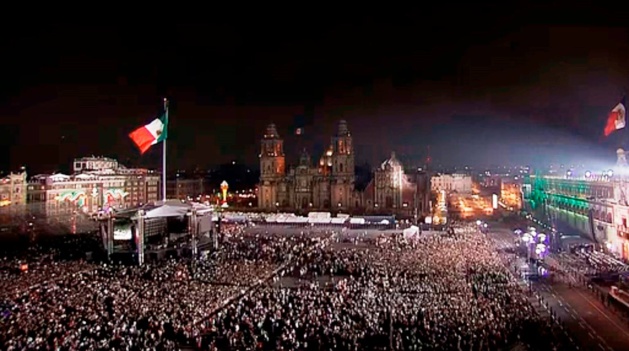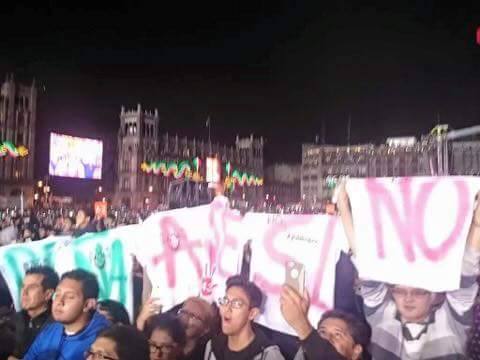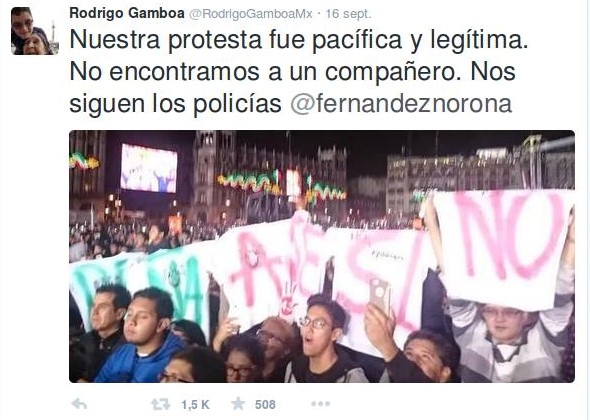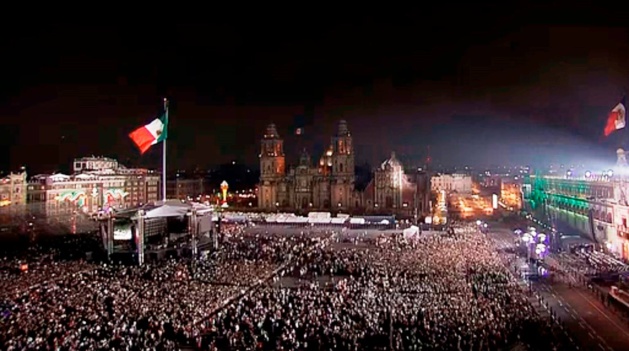
Credit DR
On the night of the 15th September, every year, people gather together throughout all of Mexico to celebrate the independence of their country. On this occasion, on the Zocalo, the main square in central Mexico City, the President is welcomed. He pays tribute in his speech to the great Mexican heroes considered as the fathers of the country and of its independence. This year, like last year, messages have been shared on social media to encourage people not to go to the Zocalo. Their aim was to show Mexico’s disagreement with the policy of their President, Enrique Peña Nieto, by leaving the square empty.
The daring of six students
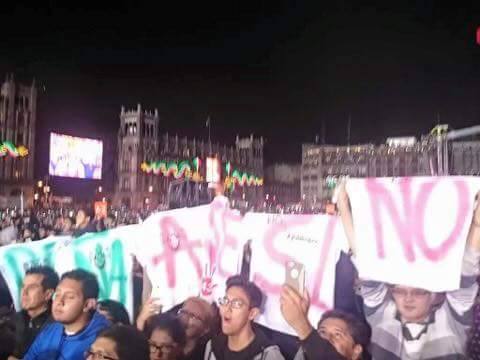
Credit DR
In a country where the President is known to use his authority against its citizens, it is not easy for them to declare what they think out loud. These six students dared to, despite the risks that their protest may have represented. “We disagree with this government which murders students, women and children every day. They murder them with hunger and lack of medical care!” says Luisa, the only girl among the six students. “We were six young people aged about twenty. Three weeks before the 15th September, we decided to protest, but we were not really prepared,” explains Rodrigo. At home, they had made six banners, on which the syllables “Pe-ña A-se-si-no”, which translate as Peña Murderer, were written (President’s name, ed.). They had not prepared anything else in addition to these bold messages. They would improvise once there.
“It was a really hard moment for us, we were clearly aware of the risks, and of what could happen. We know Peña’s policy, and we know that his government is repressive and has already been violent in the past. They kidnapped 43 students last year and people still do not know where they are. This is precisely why we had to carry our banners, because we wanted to protest against this repression,” confides Rodrigo. The fear of the six youngsters was made even stronger by the fact that plain-clothed policemen used to hide on the square to prevent any debauchery. “They are everywhere! They are people like you and me, but taking their orders from the government!” says Rodrigo.
“It was a really hard moment for us, we were clearly aware of the risks, and of what could happen. We know Peña’s policy, and we know that his government is repressive and has already been violent in the past. They kidnapped 43 students last year and people still do not know where they are. This is precisely why we had to carry our banners, because we wanted to protest against this repression,” confides Rodrigo. The fear of the six youngsters was made even stronger by the fact that plain-clothed policemen used to hide on the square to prevent any debauchery. “They are everywhere! They are people like you and me, but taking their orders from the government!” says Rodrigo.
After the President declares “Long live Allende”, the crowd shouts repeating “fuera Peña”, which means in English “Peña out! Peña out!”. Someone is screaming “Asesino” (murderer), and those shouting “Peña out!” resume.
They are surprised because they are used to everything going well, like in a TV show. They pay people to scream “long live President Peña” and those pictures are broadcasted all around the world. We surprised them!” continues Rodrigo. Quickly, it became noisy. People were getting out of the way of the policemen. “They were looking for us because we had raised our banners,” he says.
They are surprised because they are used to everything going well, like in a TV show. They pay people to scream “long live President Peña” and those pictures are broadcasted all around the world. We surprised them!” continues Rodrigo. Quickly, it became noisy. People were getting out of the way of the policemen. “They were looking for us because we had raised our banners,” he says.
The runaway
Pedro explains the moment when the six friends saw the authorities coming towards them: “we quickly understood that they were looking for us, they had torches and they were walking through the crowd in our direction. We threw away our banners and we ran away”. So they ran, holding on to each other’s elbows. Never separated, always together, that was what they had planned a few days before. Pedro was the last one in the line, he was tied to the group with one arm, and with the other he was raising his phone to record the scene.
Illegal arrests
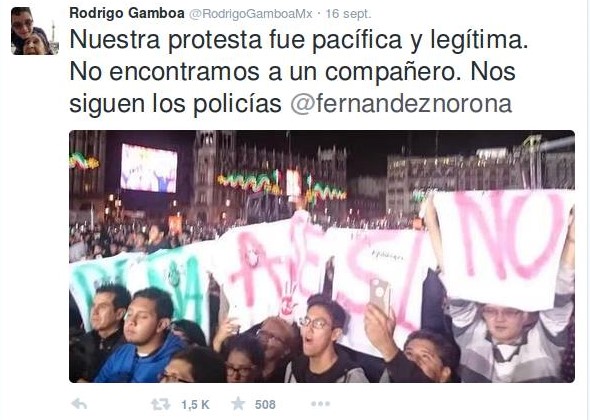
“Our protest was legitimate and peaceful. We lost one of our mates. Policemen are chasing us.” Twitter screenshot

“We need to know where our mate Pedro is, he is a law student in his fifth semester.” Twitter screenshot
Pedro keeps telling his story. “I did not know who all the people attacking me were”. His throat closes, and the twenty-year-old is struggling to talk about what happened. It was less than twenty days ago. It is the first time he has talked about this night. “It all went very fast, they put my head down so that I could not see anything, neither their faces, nor the place where we were.” Pedro could feel his phone vibrating in his trouser pocket but was not able to pick it up, his hands held behind his back.
“At one point, I was able to pick it up and I spoke to Rodrigo, for less than 15 seconds. I told him that five women had arrested me, that I did not know where I was and that they were going to take my phone. And then they snatched my phone from me.”

“They did not give him time to tell us where they were taking him. Hence, he still is considered as missing. We want him back safe and sound. Immediately!” Twitter screenshot
“Tell us what is happening! He just told me that they are leaving with him, head down, there are 6 women! Where are they taking you? They just hang up, he is a friend of ours, they are leaving with him. We want him to be freed, immediately.”
Even if very short, this call helped the five other students a lot. From then on they knew that Pedro was in trouble. “Before the protest, I had contacted very influential citizens. I had asked them to remain alert and ready to help us if things were to go wrong. I immediately alerted them after Pedro’s call, they shared the information on social media and as they have a lot of followers online, the news of Pedro’s disappearance spread quickly”, explains Rodrigo.
Even if very short, this call helped the five other students a lot. From then on they knew that Pedro was in trouble. “Before the protest, I had contacted very influential citizens. I had asked them to remain alert and ready to help us if things were to go wrong. I immediately alerted them after Pedro’s call, they shared the information on social media and as they have a lot of followers online, the news of Pedro’s disappearance spread quickly”, explains Rodrigo.

“In his penultimate call Pedro told us that five women were leaving with him, head down. The last call was another guy who picked up the phone” Twitter screenshot
Even if Pedro suspected his kidnappers were serving the government, he never officially found out who they were. His arrest was illegal. “I was out of touch with everything, I did not know where I was or what time it was. I did not know what they were going to do, how long they were going to keep me, or for how long.” Pedro did not reveal much more information. Nevertheless he added that he was retained in a van. Later on, Rodrigo revealed to Le Journal International that Pedro had been hit and physically abused whilst detained. He also suffered verbal and psychological abuse, and was the victim of violent threats. He is still very shocked by what happened to him.
After removing the blindfold, he started to panic again. He did not know where he could be, and the streets were deserted. “I was scared to see anybody, whoever it was I would have been afraid. I tried to walk back in the direction the van had come from. I wanted to walk in the opposite direction to find my phone which they had thrown out of the window. I needed it: I had no idea where I was or what time it was.” After a while, Pedro finally found his mobile. It was 5:00 am. The boy immediately called somebody he trusted to come and pick him up before calling Rodrigo.
After removing the blindfold, he started to panic again. He did not know where he could be, and the streets were deserted. “I was scared to see anybody, whoever it was I would have been afraid. I tried to walk back in the direction the van had come from. I wanted to walk in the opposite direction to find my phone which they had thrown out of the window. I needed it: I had no idea where I was or what time it was.” After a while, Pedro finally found his mobile. It was 5:00 am. The boy immediately called somebody he trusted to come and pick him up before calling Rodrigo.
Safe and sound thanks to social networks
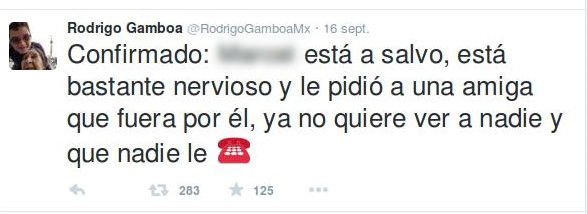
“Confirmation: Pedro is safe, he is stressed and asked to a close friend to pick him up. Now he doesn’t want to see anybody or for anybody to call him.” Screenshot from Twitter
As soon as Rodrigo and the four other students were aware of Pedro’s disappearance, they started to share the information via social media. The alert messages quickly spread thanks to the users and their numerous connections and shares. “In a few minutes, Pedro’s picture had spread and the news was buzzing,” Rodrigo explains to me. “We knew that it could save his life. They are violent and repressive, but not stupid. They know perfectly well that with so many people aware of their actions, they are not discreet anymore. Obviously it restricts them, as they would expose themselves to severe political complications.” It was from the metro, with their phones and a 3G connection as their only weapons, that the five friends strived to create as much media pressure as possible.
Hidalgo metro station, close to the main square, was a strategic meeting place for the five students. Almost everybody was leaving by metro. The station was full and nothing could have happened to them staying there. Later on, the students split up into three groups and went back to where three of them lived. “We had to go back to keep working on the media,” confides Rodrigo. “Once at home we had a lot of work to do, friends and family were calling us and we had to warn a lot of people! Moreover, a few messages were shared on the web telling us that Pedro was fine and that he just had got lost!”
Hidalgo metro station, close to the main square, was a strategic meeting place for the five students. Almost everybody was leaving by metro. The station was full and nothing could have happened to them staying there. Later on, the students split up into three groups and went back to where three of them lived. “We had to go back to keep working on the media,” confides Rodrigo. “Once at home we had a lot of work to do, friends and family were calling us and we had to warn a lot of people! Moreover, a few messages were shared on the web telling us that Pedro was fine and that he just had got lost!”
“During all this time, we were feeling very anxious and stressed,” Rodrigo remembers. “I was feeling extremely bad, I had not known Pedro for a long time, and I was scared for his parents, what was I going to tell them? You have an infinite amount of questions in your head”. Despite their emotions, the students kept going all night on sending messages and maintaining the social media buzz. “I do not know if we can say that all this buzz saved him, because I do not know if they wanted to kill him. It might be possible… but one thing I am sure about is that without all this spreading of awareness, the consequences would have been worse for Pedro”.
Their story helps us to better understand the current repressive state in Mexico, where 43 students are still reported missing after one year. In this case, the government remains the only suspect. “The repression in our country is sadly facilitated by the existence of other flaws in our system, as it is easier to kidnap someone illegally and then accuse the mafia or drug-traffickers,” explains a Professor of International Relations.
“It was very intense and I know that I will always remember it”. More than one month after his kidnapping, Pedro remains traumatised by the events. Nevertheless, he has already participated in other social movements and protests. Like him, several citizens are convinced that a better system is possible for their country. In their opinion, it is important to take action and to be heard in spite of the risks that this struggle can represent.














